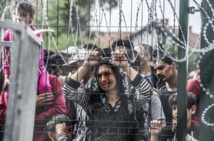Ahmad S, who fled Aleppo seven years ago and has since 2014 lived in Istanbul where he owns a grocery store, doesn't know what will happen after August 20.
That's the deadline imposed by Istanbul's governor for Syrian refugees unregistered in Turkey's financial capital to return to the provinces where they were first registered - or face expulsion.
Istanbul has 547,943 Syrians under "temporary protection," according to Interior Ministry data. Experts say the governor's order could affect 300,000 unregistered Syrians.
Deportations - even to war-ravaged Syria - were already under way in the days since the July announcement, say many Syrians and rights groups.
More than 3.6 million Syrians escaping conflict were welcomed in Turkey and offered "temporary protection," which unlike full refugee status doesn't provide complete legal protection and leaves people in a constant state of insecurity about their future.
While many refugees remain in the Turkish provinces bordering Syria - Gaziantep (445,748), Hatay (432,436) and Sanliurfa (429,735) - most move westwards to Istanbul in search of work.
Only 70,000-80,000 Syrians have work permits, says Gulseren Yoleri of Turkey's Human Rights Association (IHD).
They largely subsist in a shadow economy and form the cheapest labour force in sectors such as agriculture. With Turkey mired in an economic crisis since last year, the refugees have worn out their welcome as Turks feel the financial pinch.
The Syrians know painfully well the dangers of return. Now, the perils of staying have also surfaced - poverty, lack of documents, joblessness, risk of detention and family separations.
Ahmad's shop in Istanbul's Kucukcekmece district was among several Syrian-run businesses attacked by locals in June after rumours spread on social media of a Syrian boy harassing a Turkish girl.
Crossing over from Syria with his parents, wife and three children, Ahmad registered in the north-western city of Bursa.
There were few jobs in Bursa and Istanbul seemed a pragmatic choice at a time when the government didn't intervene as Syrians moved around Turkey more freely.
Ahmad recalls the mob shouting, "go back to your country," meting out vigilante justice with sticks and shattering store fronts.
Forced deportations aren't new. Over the last few years, even after a refugee deal between Turkey and the European Union, Turkish authorities "have been able to forcibly send people back to Syria with relative impunity ... because European governments have been turning a blind eye to these forced returns," says Amnesty International's Turkey expert Andrew Gardner.
Under the 2015 deal struck at the height of a migration crisis in the EU, it pledged 6 billion euros to help Turkey host Syrian refugees. Ankara agreed to prevent people from attempting to reach the bloc.
Europe's "record on protecting Syrian refugees is not good because they rely on Turkey to protect a disproportionate number of Syrian refugees rather than living up to their own responsibilities," Gardner tells dpa.
Turkey's laws and international agreements it has signed onto are clear that it can't forcibly send people back to a war zone where their lives are under threat, including those who have allegedly committed crimes.
Muhammad Waddah, 18, is considered a criminal by the Turkish government. He arrived in Gaziantep, southern Turkey, six years ago from Aleppo. He was registered there, went to school and played football.
In August he was deported to Idlib in north-western Syria, he tells dpa. He was caught at Istanbul airport while attempting to reach Germany with a fake passport. He says he was forced to sign a document that he wasn't allowed to read. It was likely a paper for "voluntary return."
Many refugees do return to Syria voluntarily. But Human Rights Watch (HRW) says Turkish authorities frequently use coercion.
"Turkey claims it helps Syrians voluntarily return to their country, but threatening to lock them up until they agree to return, forcing them to sign forms, and dumping them in a war zone is neither voluntary nor legal," says Gerry Simpson, HRW's associate emergencies director.
Turkish Interior Minister Suleyman Soylu denies forced deportations. "We do not have a chance to send Syrians under temporary protection back."
Mohammad Oco, 32, a shoemaker from Aleppo, is registered in Istanbul but can't make ends meet. Caring for a disabled father, two children and with a third on the way, he says he hasn't been able to pay rent since June.
"It looks like the time has come to turn the page on Turkey and move on," he tells dpa. "I have been here for seven years and things have become worse with every passing year ... Most of the time, we think our lives are at risk."
The Istanbul move is politically risky, says Murat Erdogan from the Turkish German University. The government wants to show Turks that it is "in control of the refugee issue" and also wants to "pressure Western governments,” he says, adding that many refugees will turn to Europe if Turkey takes tough measures.
But he says that the Istanbul move won't be easy to implement and could send unregistered refugees into hiding. In addition, “sending people back to Turkish cities where they are registered will create problems in those cities."
President Recep Tayyip Erdogan frequently says Turkey wants Syrians to return home, with the government already moving refugees to enclaves in north-western Syria that Ankara controls.
He has also been pushing the United States to jointly establish a "safe zone" in northern Syria so larger numbers of refugees can be repatriated.
Ahmad, the grocer, invested 200,000 Turkish liras (35,500 dollars) in his Istanbul shop. Yet he is now prepared to leave everything behind.
"We do not want to live in constant fear. They want to send me back to Bursa? How do I start from scratch there?"
-----------------------------------------------------------------------------------------------------------------










 Home
Home Politics
Politics










